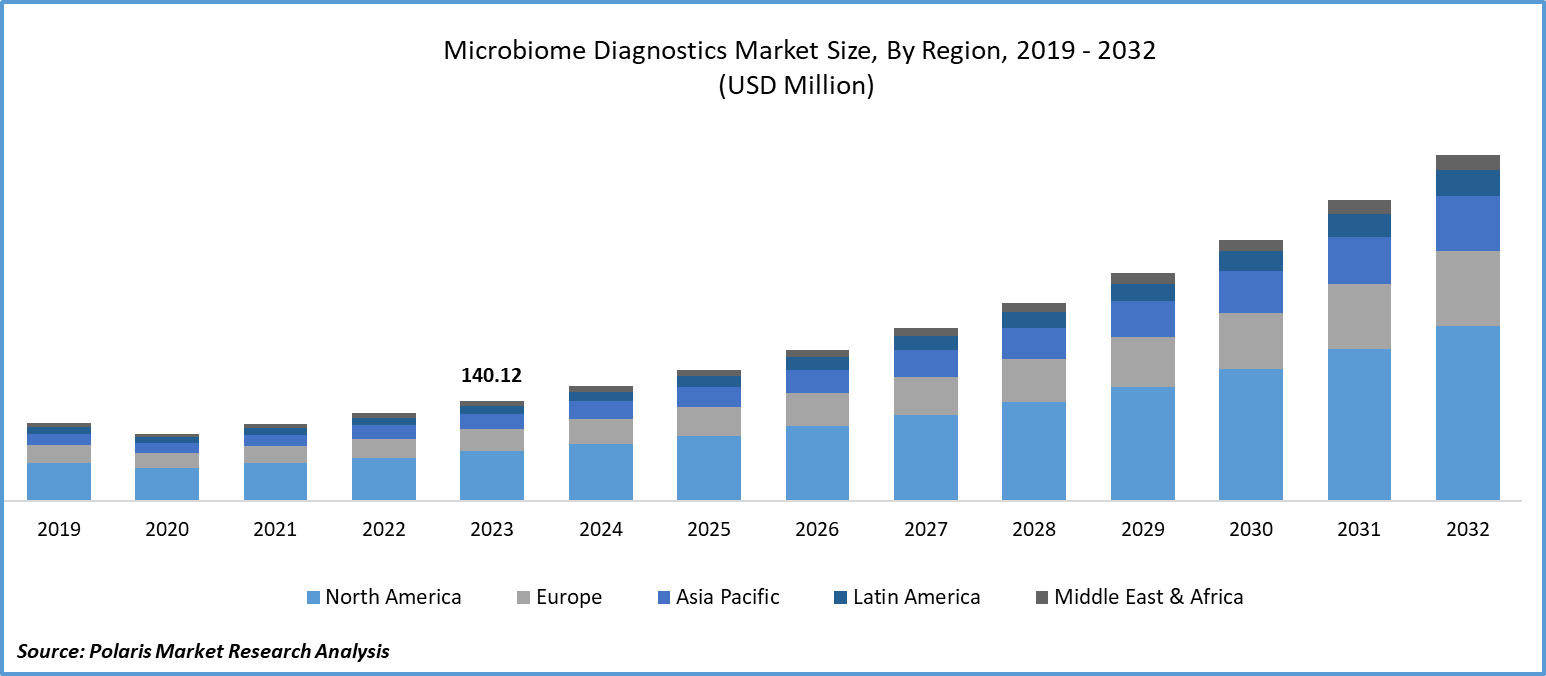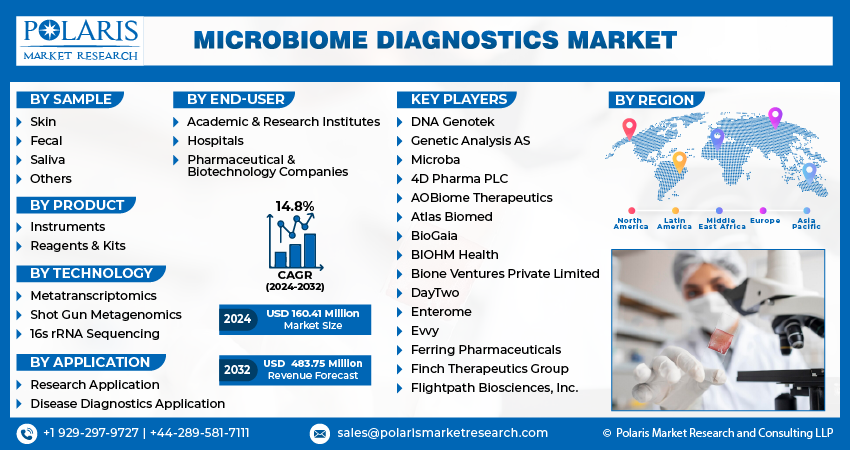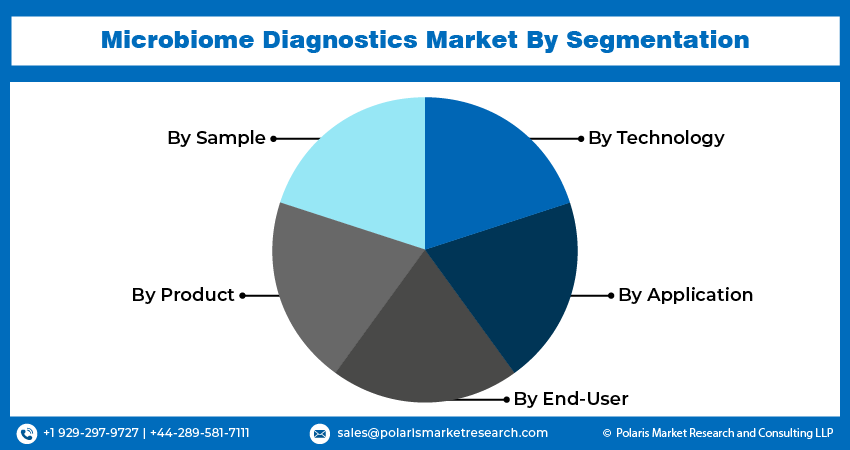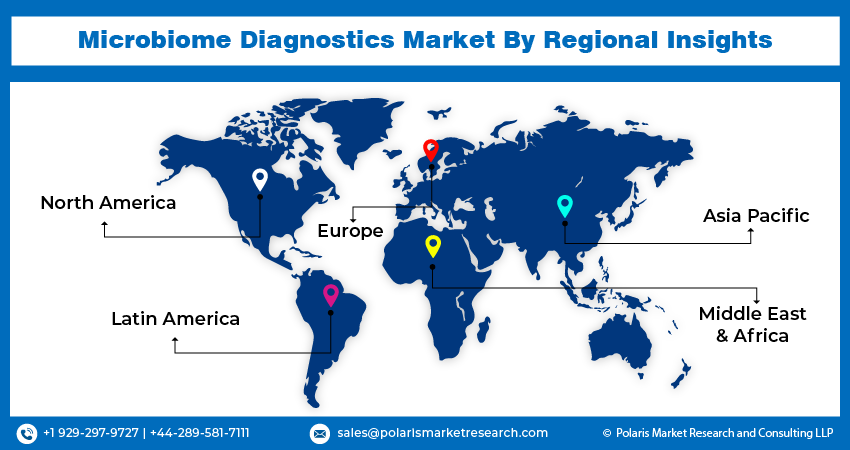
Microbiome Diagnostics Market Share, Size, Trends, Industry Analysis Report, By Sample (Skin, Fecal, Saliva); By Product; By Technology; By Application; By End-User; By Region; Segment Forecast, 2024 - 2032
- Published Date:Mar-2024
- Pages: 115
- Format: PDF
- Report ID: PM4709
- Base Year: 2023
- Historical Data: 2019-2022
Report Outlook
Global microbiome diagnostics market size was valued at USD 140.12 million in 2023. The market is anticipated to grow from USD 160.41 million in 2024 to USD 483.75 million by 2032, exhibiting a CAGR of 14.8% during the forecast period
Microbiome Diagnostics Market Overview
Microbiome diagnostics involves the use of advanced scientific processes and technologies to analyze the composition and function of microbiomes in specific environments, particularly within the human body. These methods utilize high-throughput sequencing technologies and bioinformatics tools to identify and understand the diverse array of microorganisms, including viruses, fungi, bacteria, and other microbes, present in habitats such as the oral cavities, gut, and skin. This field aims to illuminate the complex interactions between these microorganisms and their host, significantly contributing to the understanding of health and disease states. It also offers potential pathways for novel therapeutic and diagnostic developments. Microbiome diagnostics market growth plays a crucial role in personalized medicine, allowing for more precise and individualized treatment and prevention strategies based on the unique microbiome compositions of individuals.
For instance, in October 2023, Predica Diagnostics BV & TenWise BV, funded by the Dutch RVO, launched the "Targeted Microbiome Profiling (TMP)" service. This innovative service combines Predica's ciRNAseq technology with TenWise's expertise in literature mining and AI, offering a thorough analysis of microbiome communities. TMP speeds up microbiome profiling and identifies the biological pathways affecting microbiome functionality by analyzing RNA from different microbiome niches.

To Understand More About this Research: Request a Free Sample Report
The increasing incidence of chronic diseases and the microbiome's crucial role in diagnosing them have led to the global adoption of microbiome diagnostics methods. Government initiatives and support have significantly boosted research in this field, driving the microbiome diagnostics market development. Despite its promising growth, the market faces challenges due to the absence of reimbursement policies, potentially limiting patient access to these advanced tests. Nevertheless, the rise in investment in microbiome-based research is spurring the development of innovative diagnostic tools, shaping a promising future growth trajectory for the market.

Microbiome Diagnostics Market Dynamics
Market Drivers
Increased collaboration between academic and microbiome institutes is expected to drive demand for related products and services.
Research on the human microbiome is a fast-expanding topic, and industry-academia cooperation focused on microbiome research has significantly increased. Through these partnerships, industry partners and academic researchers work together to develop new microbiome-based diagnostic tools and expand our knowledge of the role of the microbiome in health and illness. The growing number of partnerships between industry and academia in microbiome research is driving the field's advancement. These collaborations create chances for new diagnostic products based on the microbiome and facilitate the transition of basic research discoveries into clinical use. By bridging academia and the microbiome industry, these partnerships combine diverse expertise and resources, enriching our knowledge of the human microbiome.
Market Restraints
Financing problems from end-users are likely to impede microbiome diagnostics market growth.
In many developing countries, academic research and development heavily rely on external funding sources. Next-generation sequencing (NGS) technology is predominantly used for microbiome analysis due to its high-throughput capabilities and ability to provide detailed insights into microbial communities. Despite ongoing efforts by governments and private organizations worldwide to allocate funds for research, many research and academic institutions still encounter budgetary limitations when it comes to acquiring and utilizing advanced and premium-priced equipment and technologies. While the cost of NGS sequencing has decreased over time, NGS sequencers remain relatively expensive, posing a significant challenge for researchers in these regions to access and utilize these technologies for microbiome research and other applications.
Report Segmentation
The market is primarily segmented based on sample, product, technology, application, end-user, and region.
|
By Sample |
By Product |
By Technology |
By Application |
By End-User |
By Region |
|
|
|
|
|
|
To Understand the Scope of this Report: Speak to Analyst
Microbiome Diagnostics Market Segmental Analysis
By Product Analysis
The instruments segment accounted for the largest microbiome diagnostics market share in 2023 and is likely to retain its position throughout the microbiome diagnostics market forecast period. Instruments play a critical role in microbiome diagnostics by enabling the accurate and precise analysis of microbiome samples. Next-generation sequencing (NGS) machines, mass spectrometers, and quantitative PCR (qPCR) devices are among the key instruments used in this field. NGS machines are essential for sequencing DNA and RNA from microbiome samples, providing detailed information about the composition of microbial communities.
Mass spectrometers are used to analyze the chemical composition of microbiome samples, helping to identify specific microbial species and their metabolic products. qPCR devices are used to quantify the abundance of specific microbial species in a sample, providing insights into the relative abundance of different microbes. Overall, these instruments are vital for identifying and quantifying microbial entities and their functions, making them indispensable tools in advancing our understanding of the microbiome and its role in health and disease.
By End-User Analysis
Based on end-user analysis, the market has been segmented on the basis of academic & research institutes, hospitals, and pharmaceutical & biotechnological companies. The pharmaceutical & biotechnology companies segment held a significant microbiome diagnostics market share in 2023. Pharmaceutical and biotechnology firms represent a substantial portion of microbiome diagnostics end-users. Their primary goal is to utilize microbiome data to create innovative therapies, personalized medicine, and advanced probiotics. These companies are deeply invested in unraveling the intricate relationships between the human microbiome and different diseases. By employing microbiome diagnostics, they aim to pinpoint new drug targets, improve drug effectiveness, and lower the occurrence of adverse effects.

Microbiome Diagnostics Market Regional Insights
The North American region dominated the microbiome diagnostics market share in 2023
The North American region dominated the microbiome diagnostics market share in 2023 and is expected to maintain its dominance over the anticipated period. The microbiome diagnostics market trends in the Americas are currently undergoing substantial growth, largely fueled by heightened research and development endeavors in the United States and Canada. The region's robust healthcare infrastructure, combined with a notable prevalence of gastrointestinal diseases and an escalating awareness regarding the significance of microbiome equilibrium, are pivotal factors propelling the uptake of microbiome diagnostics within the region. This trend underscores a growing emphasis on the importance of understanding and maintaining a healthy microbiome, driving innovation and investment in diagnostic technologies within the Americas.
The Asia Pacific region is expected to be the fastest-growing region, with a healthy CAGR during the microbiome diagnostics market forecast period. The microbiome diagnostics market opportunity in China, Japan, and South Korea is witnessing notable growth attributed to the rapid enhancement of healthcare infrastructures and escalating investments in microbiome research within these countries. Additionally, the region boasts a substantial patient pool and a rising awareness regarding the significance of microbiome testing, thereby fueling the demand for microbiome diagnostics. These factors collectively underscore a growing recognition of the role microbiome balance plays in overall health, driving the adoption of microbiome diagnostic technologies in China, Japan, and South Korea.

Competitive Landscape
The Microbiome Diagnostics market analysis is fragmented and is anticipated to witness competition due to several players' presence. Major service providers in the market are constantly upgrading their technologies to stay ahead of the competition and to ensure efficiency, integrity, and safety. These players focus on partnership, product upgrades, and collaboration to gain a competitive edge over their peers and capture a significant microbiome diagnostics market share.
Some of the major players operating in the global market include:
- DNA Genotek
- Genetic Analysis AS
- Microba
- Viome Life Sciences, Inc.
- Illumina, Inc.
- Biome Diagnostics
- Oxford Nanopore Technologies plc
- BIOHM Health
- Bione Ventures Private Limited
- DayTwo
- Enterome
- Evvy
- Quantbiome, Inc.
- ViennaLab Diagnostics GmbH
- Becton, Dickinson, and Company
Recent Developments
- In September 2023, Xume partnered with Microbiome.in and TruDiagno to enhance preventive healthcare by leveraging gut microbiome data and diagnostic indicators, offering personalized recommendations through AI-powered grocery scoring.
- In September 2023, Evvy raised USD 14 million in a successful Series A financing round led by Left Lane Capital, with contributions from General Catalyst, LabCorp Venture Fund, and other notable investors. The company is a leader in women's healthcare, focusing on understanding female biomarkers, particularly the vaginal microbiome.
Report Coverage
The Microbiome Diagnostics market report emphasizes key regions across the globe to provide a better understanding of the product to the users. Also, the report provides market insights into recent developments and trends and analyzes the technologies that are gaining traction around the globe. Furthermore, the report covers an in-depth qualitative analysis pertaining to various paradigm shifts associated with the transformation of these solutions.
The report provides a detailed analysis of the market while focusing on various key aspects such as competitive analysis, sample, product, technology, application, end-user, and their futuristic growth opportunities.
Microbiome Diagnostics Market Report Scope
|
Report Attributes |
Details |
|
Market size value in 2024 |
USD 160.41 million |
|
Revenue Forecast in 2032 |
USD 483.75 million |
|
CAGR |
14.8% from 2024 – 2032 |
|
Base year |
2023 |
|
Historical data |
2019 – 2022 |
|
Forecast period |
2024 – 2032 |
|
Quantitative units |
Revenue in USD million and CAGR from 2024 to 2032 |
|
Segments Covered |
By Sample, By Product, By Technology, By Application, By End-User, By Region |
|
Regional scope |
North America, Europe, Asia Pacific, Latin America; Middle East & Africa |
|
Customization |
Report customization as per your requirements with respect to countries, regions, and segmentation. |
FAQ's
The Microbiome Diagnostics Market report covering key segments are sample, product, technology, application, end-user, and region.
Microbiome Diagnostics Market Size Worth $483.75 Million By 2032
Microbiome Diagnostics Market exhibiting a CAGR of 14.8% during the forecast period
North American is leading the global market
key driving factors in Microbiome Diagnostics Market are rising number of partnerships between academic and microbiome institutes
